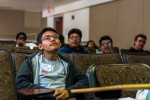High school students learned about squirrel feeding, laser cooling and the Royal Ballet of Cambodia in classes led by UCLA students during an event Saturday.
Splash is a nationwide program that holds yearly events during which college students teach informal introductory classes on various topics to high school students. Though other universities such as Stanford and the Massachusetts Institute of Technology have participated in the program for decades, fourth-year math and computing student Xiangwen Kuan brought Splash to UCLA for the first time last year. About 70 high school students attended the club’s event this year, Kuan said.
Classes offered at Splash this year included lessons on the evolution of teen film, analyzing stock charts and Russian prison tattoos. Each class was designed entirely by college students and lasted for one to two hours.
Kuan said he started the event because of his experience sharing interests with his classmates at a technical high school in Singapore.
“I was in school with really cool classmates, so I started a random interest group where we shared what we learned that week,” he said.
When Kuan told a friend at MIT about his interest in creating a similar group at UCLA, his friend recommended he start a Splash club on campus.
Kuan said Splash relies on the enthusiasm of the UCLA students who volunteer to teach at the event.
“The fact that you are signing up to teach this class means that you are so passionate that you can teach this class better than anyone. That’s the kind of faith we have in our teachers,” he said. “You just do your thing, because your thing is the best thing there is.”
One class taught in the afternoon, entitled “Medical Anthropology: Demystifying the White Coat,” examined how cultural attitudes surrounding physicians impact health care.
Camille Marie Chan, the third-year anthropology student who taught the class, said her experiences with nontraditional medicine, including visiting an ayurvedic doctor and interning with an acupuncture physician inspired her to teach the class.
Chan said she was fascinated by how these cultures approached patient care more holistically than Western hospitals, which she felt were more sterile. At an American hospital she worked at, she was forced to refer to patients by number rather than name, which she said maximized efficiency but felt dehumanizing.
“Sometimes, medicine becomes a business where you might feel like you are purchasing your care,” Chan said to her class.
Hannah Holden, a third-year applied linguistics student and administrator of the event, said Splash gave her the opportunity to share her passions for accents and tactical combat casualty care with students.
Holden, a cadet with the Reserve Officers’ Training Corps, said her tactical combat casualty care class gave students an introduction to the decisions and procedures a medic would use to treat soldiers under fire. Students learned how to make a tourniquet and treat a sucking chest wound.
In her other class, “The Power of Accents,” Holden said she enjoyed showing students how modulating their own voices could change how others perceive them.
“I go in there and play videos of Hollywood actors that sound horrible,” Holden said. “Linguistics to me is just another way to look at the world, but a lot of the high schoolers I teach think it’s just about learning as many languages as possible.”
Several students who attended the event said that they were impressed with the caliber of instruction they received from the UCLA students leading the lessons.
Daosiri Rattanamansuang, a 10th-grader at Granada Hills Charter High School who attended the event, heard about Splash through a school bulletin. She said she enjoyed learning about medical anthropology because it was a topic she had not learned about in school.
“Today, I learned about … the irony and comical definition of how people view the societies and cultures of other people, and it made me think about how we don’t understand and (are) so quick to judge,” she said.
Deborah Gonzalez, a 10th-grader from Pacific Palisades High School who took Chan’s class, said she enjoyed learning about common medical advice myths, such as the idea that eating food late at night causes weight gain.
“All kinds of high school students would enjoy this – they have something for everyone,” she said.
Holden, who will coordinate the event after Kuan graduates this year, said she thinks the most gratifying part of Splash was the impact she made on her students.
“(At Splash), your involvement in what you’re teaching is very, very obvious,” she said. “You don’t have to remember the names of the kids you taught. What matters is the feeling that you get when you walk out and realize you made someone’s day more interesting.”
